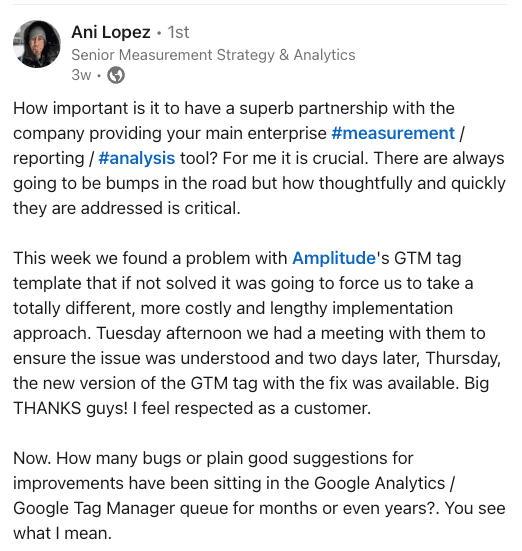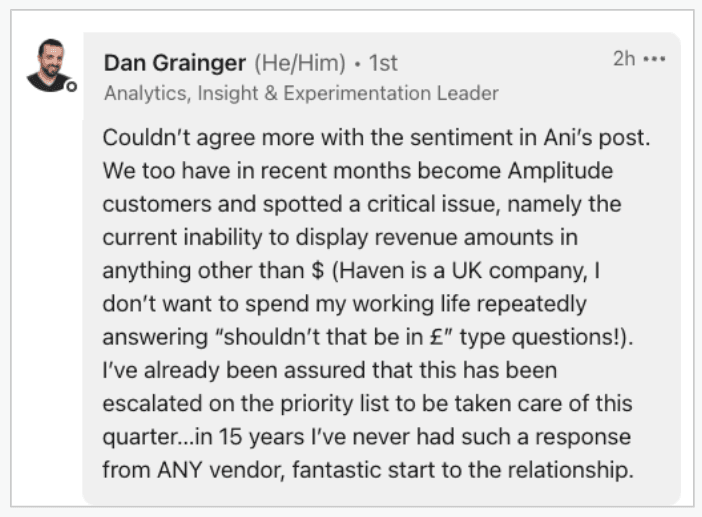Why Vendor Customer Support Matters
Learn why customer support is a key component of the customer-vendor relationship.
I recently wrote a blog post about how organizations choose digital analytics products. One of the decision criteria I cited in that post was customer support. In this post, I’d like to dive deeper into this topic and why customer support is so important.
Mutually Beneficial Relationship
Over the past few decades, relationships between customers and vendors have been primarily transactional. The customer pays for the product, and the vendor provides the product and support. The vendor gets money for providing the product, and the customer [hopefully] gets incremental value from using the product (or service). But that is an outdated way of thinking about the customer-vendor relationship.
Customers should expect (and demand) more from their vendors than just a product. Unlike customers with only one instance of the vendor’s product or service, vendors often have hundreds or thousands of product instances. Vendors have insights into how their customers use their products and services. Therefore, they know much more about best practices and potential “gotchas” related to their product. But customers often don’t press their vendor to get these best practices as they deploy and use their product. Some of this help should be included with the product’s price, but if significant help is needed, it is often provided by paid consulting services from the vendor or its partners.
This is also why having a direct relationship with your vendor is essential. One of the complaints I have always had about Google Analytics is that most customers have an agency or consulting firm as an intermediary. While I am sure those firms know the product well and provide excellent service, there is no substitute for talking directly to the vendor’s product team about bugs or potential feature requests. How much power does your agency have to lobby a large vendor like Google for new features or to fix bugs? Instead, you go to discussion forums to try and build grassroots support for bugs and new features.
At Amplitude, we have doubled down on direct customer support for this very reason. Here is a recent customer example:

Customers want to be heard. They want to be respected. I have found that to be very difficult when there isn’t some sort of direct relationship between the customer and the vendor.
I read an old study that found that customers rate vendors/service providers higher if they have encountered an issue with the vendor vs. those for whom they have never had a problem. At first, this sounds counterintuitive. Why would companies prefer vendors that have had issues over those who have had no issues? The study explains that the most critical factor is having a problem and resolving it satisfactorily. When companies have never had a problem with a vendor, they worry/assume that the vendor will not do a great job addressing it. This is likely due to years of poor customer support from many vendors! But if you handle the issue well, customer satisfaction can rise dramatically. Here is an example of an Amplitude customer who recently had a problem and had it addressed directly:

This potentially negative customer interaction ended up turning into a positive one through helpful and attentive support. This is another reason why vendors should place more emphasis on support. We all know that it is much cheaper to keep the customers you have than to find new ones. In addition, customers who receive great support (like Ani and Dan above) are much more likely to recommend products and services to their peers.
Treating the customer-vendor relationship as a long-term partnership can benefit the customer and the vendor. The customer gets excellent support, and the vendor can leverage its support to retain customers and possibly even gain new customers.
Product-Led Growth
From a vendor perspective, supporting customers is a fantastic way to discover how they use the product and get future feature ideas. Many vendors treat support as something they “have to do” and approach it with a minimalist attitude. They outsource support overseas to resources who don’t know the product and often just read scripts or product documentation.
At Amplitude, we are big believers in product-led growth. Vendors are a collection of all of their customers. Customers are the ones who push you to build new products and new features. Therefore, the better your customers, the better your products will be. When Amplitude interacts with customers like PayPal, Square, Doordash, and others, we are fortunate to work with the best of the best. Savvy customers often identify exciting ways to leverage your product and mind-blowing feature requests.
Of course, product-led growth only works if vendors excel at listening to customers. This is why Amplitude’s product team spends so much time talking to customers and prospects about what they need our products to do to make their lives easier. Some vendors purposely hide their product teams from customers or limit access to those on customer advisor boards (CABs). Feature requests go through multiple layers until they get so watered down that they lose their potency. Companies that fail to adopt a product-led approach will eventually fall behind their competition and lose relevance and market share.
I like to think of support as an extension of your product team. Vendor support teams are like the extremities of the human body. They are the first to sense customer pain; if you are smart, you will be sure to listen to those signals within your organization.
Don’t Forget Sales Support
Another neglected aspect of product support is the sales process. When working with a potential customer, how you support them can indicate the type of support they will get if they become a customer. Sometimes vendors get frustrated by how much work prospects will make them go through during the sales process. This is the wrong attitude. If a prospect is giving you many questions to answer or makes you do multiple product demos, they are likely interested in your product or wouldn’t waste their time. Instead of being annoyed, recognize that the prospects are giving you free insights into what the marketplace is looking for. They are also giving your team practice in demonstrating its product and possibly good feedback to improve future demonstrations. If they point out features your product is missing that they need, think of it as free product request! And if they tell you that a competitor has or is building features that you don’t have, they are now helping you with competitive intelligence!
We recently worked with a prospect our team didn’t see as an advocate for Amplitude since he was much more familiar with competing analytics products. He gave us a few pages worth of pretty detailed questions. Our team reviewed the questions and provided thoughtful responses. These responses took a ton of time, research, and coordination. But once we answered them, our next meeting went well, and a possible detractor turned into a potential advocate. Here is a note he sent to the Amplitude sales lead:

This is just one example of why sales support can be as valuable as customer support.
Final Thoughts
When contemplating which vendors you will select, remember that you are entering into a potentially long-term relationship with that vendor. That relationship will require support starting with the sales process, through implementation, and beyond. Consider the items above when deciding since selecting a vendor involves much more than buying a software product or service.

Adam Greco
Former Product Evangelist, Amplitude
Adam Greco is one of the leading voices in the digital analytics industry. Over the past 20 years, Adam has advised hundreds of organizations on analytics best practices and has authored over 300 blogs and one book related to analytics. Adam is a frequent speaker at analytics conferences and has served on the board of the Digital Analytics Association.
More from Adam




